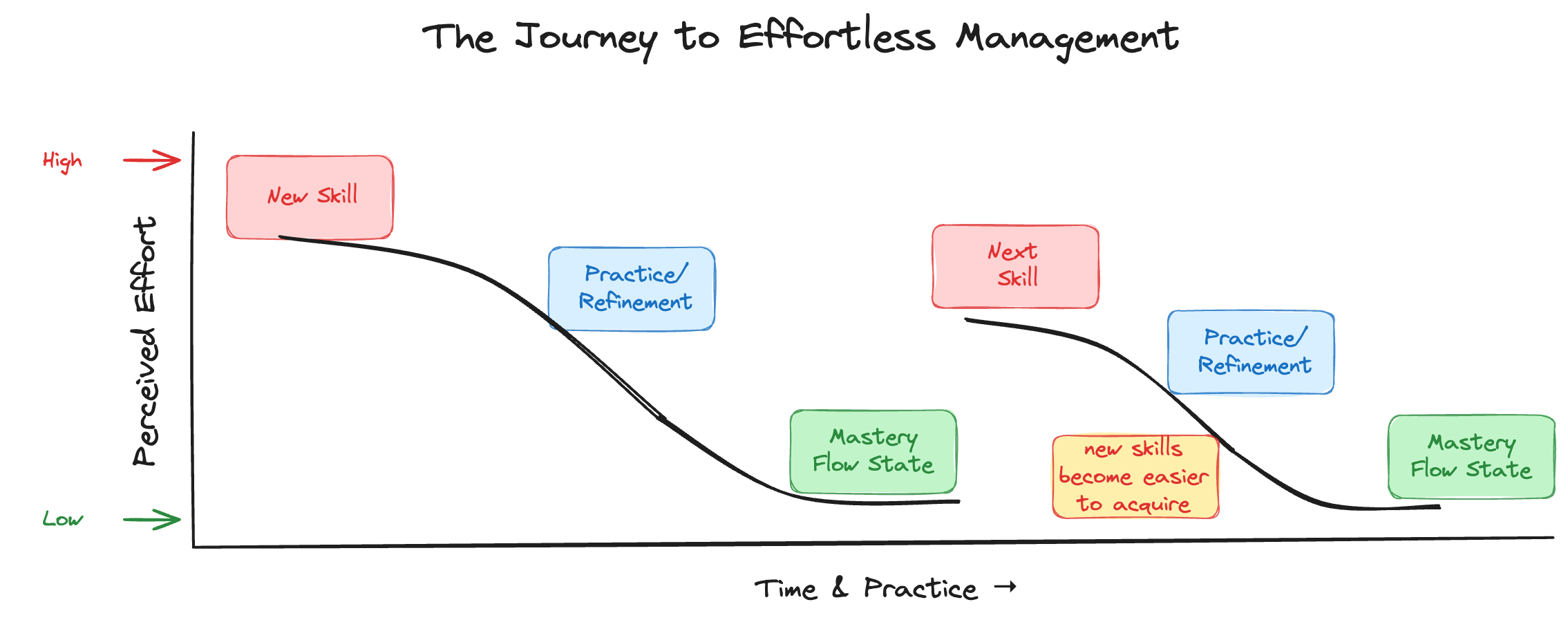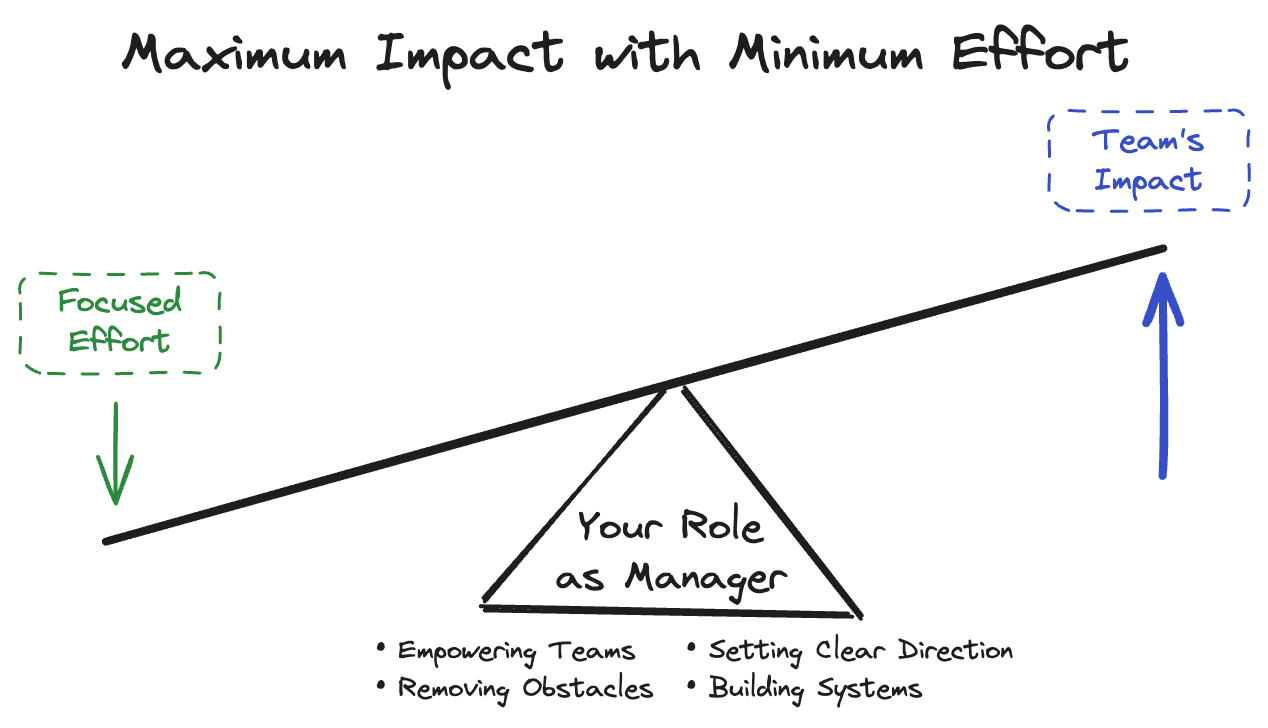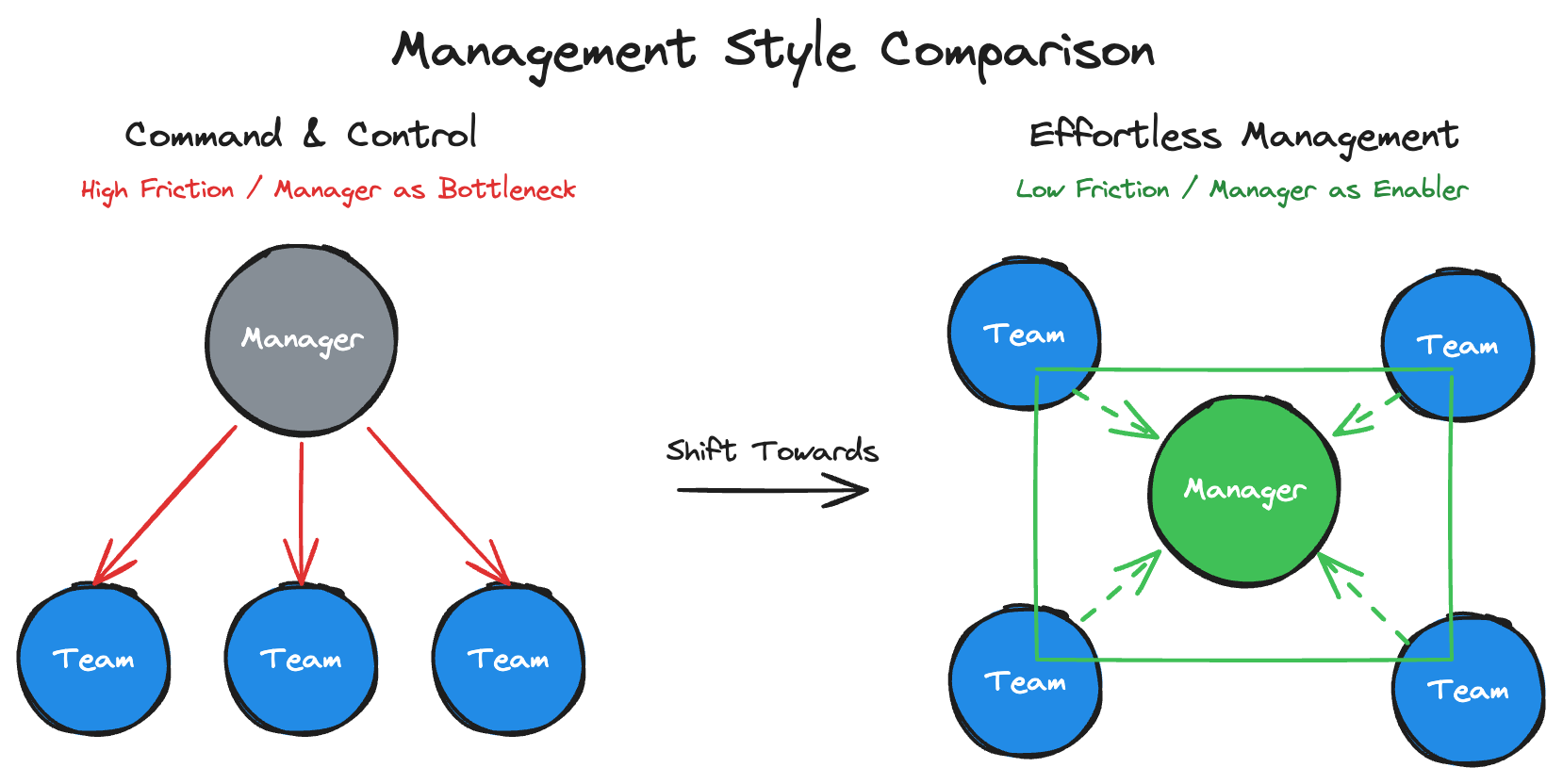Recently one of my engineers asked me: “What exactly do you mean by ‘effortless management’?” It struck me that while I had used this phrase a lot (and even registered a domain name for it…), I had never truly articulated the concept before, despite it being a core principle in my approach to leadership. I also realized that without context this made me sound like an unengaged, disinterested, and lazy manager, rather than the fully engaged, empowering leader I like to be. I suspect this is what his question was hinting at!
So, in this post I’ll do my best to explain this idea and share how it can make your life as a manager easier while empowering those around you. Done well, I believe this approach results in happier, more effective managers and teams. Wouldn’t it be great if managing felt like being in a coding flow state rather than an uphill battle?
What is effortless management?
Effortless management is an approach to engineering management that recognizes that we do our best work when we are our best selves. It’s more of a set of values than a specific set of practices. Now, “effortless” doesn’t mean zero effort or being lazy. It means applying your effort and, critically, your finite energy, where they have the greatest impact. It’s about achieving maximum results with focused, high-leverage work, much like a master craftsman makes a difficult task look easy through skill and optimized technique.
If I had to distill it, I’d say an effortless manager values:
- teams over individuals
- empowerment and autonomy over command and control
- long term development over short term wins
In my experience, acting from these values consistently over time leads to a low-effort, highly-rewarding style of management that creates an effective and satisfying work environment for all involved.
Mastery leads to effortlessness
When you truly master a skill, it begins to feel effortless. So, at its core, Effortless Management is about mastering the craft of engineering management. This journey can be visualized like a mastery curve. Note how mastery builds on itself: as mastery is acquired, related skills are easier to build and retain.

This is particularly relevant for engineers transitioning into management roles, who often find themselves overwhelmed by the shift in responsibilities. Unlike their previous roles, where they were accountable for the work they completed, managers are now tasked with ensuring that the work gets done by their teams. This shift can leave new managers feeling like they aren’t “doing anything,” which can lead to the temptation to create unnecessary work to feel valuable.
Does this feeling of needing to constantly ‘do something’ to prove your worth as a manager sound familiar?
However, this need to do something creates a cycle of busywork that creates more headaches than solutions. Effortless management challenges the misconception that activity equals productivity. Instead, it emphasizes that the result is what truly matters, not the effort put into achieving it.
Maximum impact with minimum effort
A question I often ask myself is: How can I have the maximum impact with the minimum amount of effort? This may be the most critical question in effortless management. This isn’t about shifting work to make your day easier; this is the question everyone in your orbit should ask themselves. Think of management as a leverage position, as illustrated below:

As a manager, you occupy a leverage position, which means your role is about amplifying the efforts of your team. By finding techniques that empower those around you, encouraging self-accountability, and helping them identify the most important work, you create a virtuous cycle of improvement within your team.
This approach not only leads to shipping higher-quality software on time but also improves customer experience. Team members feel empowered and can act with autonomy. In short, effortless management is about fostering an environment where everyone can thrive.
Scaling yourself and expanding scope
One of the most significant advantages of adopting an effortless management style is the ability to scale effectively to larger scopes and responsibilities. As teams grow and projects become more complex, traditional micromanaging approaches can lead to burnout and inefficiency. This can be seen when comparing management styles:

Does the idea of your team thriving without constant oversight feel like a distant dream?
Effortless management fosters a culture of accountability and empowerment, where team members feel confident in their abilities to contribute meaningfully. As a result, they can take on larger projects and more complex challenges without feeling overwhelmed. Effortless management becomes a catalyst for growth—not just for ourselves as managers, but for our teams and the organization as a whole. By managing efficiently and effortlessly, we position ourselves to embrace greater responsibilities with ease, paving the way for innovation and success within our teams and beyond.
As one of my friends likes to say, “If you can’t be replaced, you can’t be promoted.” Eventually, you will have a team that feels like it runs itself. At this point, you are ready for an expanded scope.
Managing your most precious resource: energy
Beyond managing tasks and teams, one of the most critical aspects of leadership is managing your own energy. Think of energy as your most precious resource – it impacts your clarity of thought, your ability to connect with others, and your overall effectiveness. How you spend your energy as a leader has a ripple effect on your team and the work itself.
Part of mastering the craft of management is learning to use this energy wisely, focusing it where it will have the maximum impact rather than allowing it to be depleted by busywork or constant firefighting. The practices inherent in effortless management – empowering your team, focusing on results over activity, and building systems that allow for autonomy – are powerful ways to ensure your energy is directed towards strategic work and amplifying your team, rather than being consumed by micromanagement or unnecessary tasks. By leading effortlessly, you make the most out of this vital resource, sustaining your own effectiveness and enjoyment in the role.
The elegance of effortlessness
Beyond the practical benefits, the idea of effortless management resonates with my personal sense of elegance. I get a deep satisfaction from the process of learning and refining my understanding and capabilities. This is as true for my hobbies as it is for work. I find joy in delving deeply into subjects that interest me, and while this love for learning enhances my ability to lead, sometimes that feels like a side effect of scratching my itch to learn.
Ready to explore more?
Effortless management is a transformative approach that emphasizes mastery, empowerment, and a focus on results rather than activity. By valuing teams over individuals, fostering autonomy, and prioritizing long-term development, I find that I create a rewarding work environment that benefits everyone involved. This philosophy has helped me navigate the challenges of transitioning from engineering to management and from managing one team to managing an organization spanning continents, all while allowing me to maximize my impact while minimizing effort.
Are you ready to explore how mastering the craft of management can create a more satisfying experience for you and your team? If these ideas resonate with you, I hope you’ll continue to follow my posts here, where I share more insights into Effortless Management and building high-performing, satisfying teams in your management career.
Photo by Lori Stevens on Unsplash